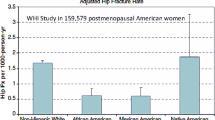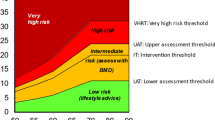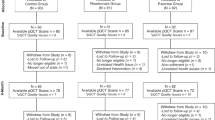Abstract
Fractures are common in patients with chronic kidney disease (CKD) and associated with substantially high morbidity and mortality. Bone mass measurements are commonly used to assess fracture risk in the general population, but the utility of these measurements in patients with CKD, and specifically among those on hemodialysis, is unclear. This review will outline the epidemiology and etiology of fractures in patients with CKD with a particular emphasis on men and women on hemodialysis. As well, we will summarize the published data, which describes the association between risk factors for fracture (including bone mass measurements, biochemical markers of mineral metabolism, and muscle strength) and fractures in patients with CKD. Patients with CKD suffer from fractures due to impairments in bone quantity, bone quality, and abnormalities of neuromuscular function. There is a paucity of evidence on the associations between bone quality, bone turnover markers, neuromuscular function, and fractures in patients with CKD. Furthermore, the complex etiology of fractures combined with the technical limitations of bone mineral density testing, both by dual energy X-ray absorptiometry (DXA) and by peripheral quantitative tomography (pQCT), limits the clinical utility of bone mass measurements for fracture prediction in CKD; this is particularly true among patients with stages 4 and 5 CKD. Further prospective studies to identify noninvasive measures of bone strength that can be used for fracture risk assessment are needed.

Similar content being viewed by others
References
National Kidney Foundation (2002) K/DOQI clinical practice guidelines for chronic kidney disease: evaluation, classification, and stratification. Am J Kidney Dis 39:S1–S266
Jamal S (2003) Fractures in men and women with dialysis-dependent renal failure. Endocrinol Rounds 3
Jamal SA, Gilbert J, Gordon C, Bauer DC (2006) Cortical PQCT measures are associated with fractures in dialysis patients. J Bone Miner Res 21:543–548
Jamal SA, Leiter RE, Jassal V, Hamilton CJ, Bauer DC (2006) Impaired muscle strength is associated with fractures in hemodialysis patients. Osteoporosis Int 17(9):1390–1397, Epub 24 Jun 2006
Malluche HH, Faugere MC (1989) Renal osteodystrophy. New Engl J Med 321:317–318
Lindberg JS, Moe SM (1999) Osteoporosis in end-state renal disease. Semin Nephrol 19:115–122
Atsumi K, Kushida K, Yamazaki K et al (1999) Risk factors for vertebral fractures in renal osteodystrophy. Am J Kidney Dis 33:287–293
Chan YL, Furlong TJ, Cornish CJ, Posen S (1985) Dialysis osteodystrophy. A study involving 94 patients. Medicine (Baltimore) 64:296–309
Schaab PC, Murphy G, Tzamaloukas AH et al (1990) Femoral neck fractures in patients receiving long-term dialysis. Clin Orthop 224–231
Vonesh EF, Moran J (1999) Mortality in end-stage renal disease: a reassessment of differences between patients treated with hemodialysis and peritoneal dialysis. J Am Soc Nephrol 10:354–365
Eknoyan G (1999) Cardiovascular mortality and morbidity in dialysis patients. Miner Electrolyte Metab 25:100–104
Nickolas TL, McMahon DJ, Shane E (2006) Relationship between moderate to severe kidney disease and hip fracture in the United States. J Am Soc Nephrol 17:3223–3232
Ensrud KE, Lui LY, Taylor BC et al (2007) Renal function and risk of hip and vertebral fractures in older women. Arch Intern Med 167:133–139
Dukas LC, Schacht E, Mazor Z, Stahelin HB (2005) A new significant and independent risk factor for falls in elderly men and women: a low creatinine clearance of less than 65 ml/min. Osteoporosis Int 16:332–338
Alem AM, Sherrard DJ, Gillen DL et al (2000) Increased risk of hip fracture among patients with end-stage renal disease. Kidney Int 58:396–399
Coco M, Rush H (2000) Increased incidence of hip fractures in dialysis patients with low serum parathyroid hormone. Am J Kidney Dis 36:1115–1121
Moe S, Drueke T, Cunningham J et al (2006) Definition, evaluation, and classification of renal osteodystrophy: a position statement from Kidney Disease: Improving Global Outcomes (KDIGO). Kidney Int 69:1945–1953
NIH (2000) Osteoporosis prevention, diagnosis, and therapy. NIH Consensus Statements 17:1–45
Jamal S, Chase C, Goh Y, Richardson R, Hawker G (2002) Bone density and heel ultrasound testing do not identify patients with dialysis-dependent renal failure who have had fractures. Am J Kidney Dis 39:843–849
Miller PD (2009) Diagnosis and treatment of osteoporosis in chronic renal disease. Semin Nephrol 29:144–155
Miller PD (2009) Fragility fractures in chronic kidney disease: an opinion-based approach. Cleveland Clin J Med 76:715–723
Sakhaee K, Gonzalez GB (1999) Update on renal osteodystrophy: pathogenesis and clinical management. Am J Med Sci 317:251–260
KDIGO clinical practice guideline for the diagnosis, evaluation, prevention, and treatment of chronic kidney disease-mineral and bone disorder (CKD-MBD). Kidney international 2009:S1–130
Jee WS (2005) The past, present, and future of bone morphometry: its contribution to an improved understanding of bone biology. J Bone Miner Metab 23(Suppl):1–10
Parfitt AM (2003) Renal bone disease: a new conceptual framework for the interpretation of bone histomorphometry. Curr Opin Nephrol Hypertens 12:387–403
Kanis JA, Oden A, Johansson H et al (2009) FRAX and its applications to clinical practice. Bone 44:734–743
Altman DG, Bland JM (1995) Absence of evidence is not evidence of absence. Br Med J Clin Res ed 311:485
Miller PD, Zapalowski C, Kulak CA, Bilezikian JP (1999) Bone densitometry: the best way to detect osteoporosis and to monitor therapy. J Clin Endocrinol Metab 84:1867–1871
Barrett-Connor E, Siris ES, Wehren LE et al (2005) Osteoporosis and fracture risk in women of different ethnic groups. J Bone Miner Res 20:185–194
Leslie WD, Lix LM. Absolute fracture risk assessment using lumbar spine and femoral neck bone density measurements: derivation and validation of a hybrid system. J Bone Miner Res 26:460–467
Rix M, Andreassen H, Eskildsen P, Bente L, Olgaard K (1999) Bone mineral density and biochemical markers of bone turnover in patients with predialysis chronic renal failure. Kidney Int 56:1084–1093
Hsu CY, Cummings SR, McCulloch CE, Chertow GM (2002) Bone mineral density is not diminished by mild to moderate chronic renal insufficiency. Kidney Int 61:1814–1820
Ishani A, Paudel M, Taylor BC et al (2008) Renal function and rate of hip bone loss in older men: the osteoporotic fractures in men study. Osteoporos Int 19:1549–1556
Jassal SK, von Muhlen D, Barrett-Connor E (2007) Measures of renal function, BMD, bone loss, and osteoporotic fracture in older adults: the Rancho Bernardo study. J Bone Miner Res 22:203–210
Jamal SA, Swan VJ, Brown JP et al (2009) Kidney function and rate of bone loss at the hip and spine: the Canadian multicentre osteoporosis study. Am J Kidney Dis 55(2):291–299
Miller PD, Roux C, Boonen S et al (2005) Safety and efficacy of risedronate in patients with age-related reduced renal function as estimated by the Cockcroft and Gault method: a pooled analysis of nine clinical trials. J Bone Miner Res 20:2105–2115
Jamal SA, Bauer DC, Ensrud KE et al (2007) Alendronate treatment in women with normal to severely impaired renal function: an analysis of the fracture intervention trial. J Bone Miner Res 22:503–508
Ishani A, Blackwell T, Jamal SA, Cummings SR, Ensrud KE (2005) The effect of raloxifene treatment in postmenopausal women with kidney disease: an analysis of the multiple outcomes of raloxifene evaluation study. J Am Soc Nephrol Absract
Miller PD, Schwartz EN, Chen P, Misurski DA, Krege JH (2007) Teriparatide in postmenopausal women with osteoporosis and mild or moderate renal impairment. Osteoporos Int 18:59–68
Yamaguchi T, Kanno E, Tsubota J et al (1996) Retrospective study on the usefulness of radius and lumbar bone density in the separation of hemodialysis patients with fractures from those without fractures. Bone 19:549–555
Fontaine MA, Albert A, Dubois B, Saint-Remy A, Rorive G (2000) Fracture and bone mineral density in hemodialysis patients. Clin Nephrol 54:218–226
Kaji H, Suzuki M, Yano S et al (2002) Risk factors for hip fracture in hemodialysis patients. Am J Nephrol 22:325–331
Jamal SA, Hayden JA, Beyene J (2007) Low bone mineral density and fractures in long-term hemodialysis patients: a meta-analysis. Am J Kidney Dis 49:674–681
Duan Y, De Luca V, Seeman E (1999) Parathyroid hormone deficiency and excess: similar effects on trabecular bone but differing effects on cortical bone. J Clin Endocrinol Metab 84:718–722
Christiansen P, Steiniche T, Brockstedt H et al (1993) Primary hyperparathyroidism: iliac crest cortical thickness, structure, and remodeling evaluated by histomorphometric methods. Bone 14:755–762
Dolgos S, Hartmann A, Bonsnes S et al (2008) Determinants of bone mass in end-stage renal failure patients at the time of kidney transplantation. Clin Transplant 22:462–468
Elder GJ, Mackun K (2006) 25-Hydroxyvitamin D deficiency and diabetes predict reduced BMD in patients with chronic kidney disease. J Bone Miner Res 21:1778–1784
Ersoy FF, Passadakis SP, Tam P et al (2006) Bone mineral density and its correlation with clinical and laboratory factors in chronic peritoneal dialysis patients. J Bone Miner Metab 24:79–86
Ashe MC, Khan KM, Kontulainen SA et al (2006) Accuracy of pQCT for evaluating the aged human radius: an ashing, histomorphometry and failure load investigation. Osteoporos Int 17:1241–1251
Kontulainen S, Liu D, Manske S et al (2007) Analyzing cortical bone cross-sectional geometry by peripheral QCT: comparison with bone histomorphometry. J Clin Densitom 10:86–92
Parfitt AM (1998) A structural approach to renal bone disease. J Bone Miner Res 13:1213–1220
Obatake N, Ishimura E, Tsuchida T et al (2007) Annual change in bone mineral density in predialysis patients with chronic renal failure: significance of a decrease in serum 1,25-dihydroxy-vitamin D. J Bone Miner Metab 25:74–79
Nickolas TL, Stein E, Cohen A, Thomas V, Staron RB, McMahon DJ, Leonard MB, Shane E. (2010) Bone mass and microarchitecture in CKD patients with fracture. J Am Soc Nephrol 21(8):1371–80
Russo CR, Taccetti G, Caneva P et al (1998) Volumetric bone density and geometry assessed by peripheral quantitative computed tomography in uremic patients on maintenance hemodialysis. Osteoporos Int 8:443–448
Hasegawa K, Hasegawa Y, Nagano A (2004) Estimation of bone mineral density and architectural parameters of the distal radius in hemodialysis patients using peripheral quantitative computed tomography. J Biomech 37:751–756
Negri AL, Barone R, Lombas C, Bogado CE, Zanchetta JR (2006) Evaluation of cortical bone by peripheral quantitative computed tomography in continuous ambulatory peritoneal dialysis patients. Hemodial Int 10:351–355
Fried LF, Biggs ML, Shlipak MG et al (2007) Association of kidney function with incident hip fracture in older adults. J Am Soc Nephrol 18:282–286
Danese MD, Kim J, Doan QV et al (2006) PTH and the risks for hip, vertebral, and pelvic fractures among patients on dialysis. Am J Kidney Dis 47:149–156
Stehman-Breen CO, Sherrard DJ, Alem AM et al (2000) Risk factors for hip fracture among patients with end-stage renal disease. Kidney Int 58:2200–2205
Levin A, Bakris GL, Molitch M et al (2007) Prevalence of abnormal serum vitamin D, PTH, calcium, and phosphorus in patients with chronic kidney disease: results of the study to evaluate early kidney disease. Kidney Int 71:31–38
Vassalotti JA, Uribarri J, Chen SC et al (2008) Trends in mineral metabolism: kidney early evaluation program (KEEP) and the national health and nutrition examination survey (NHANES) 1999–2004. Am J Kidney Dis 51:S56–S68
Meier C, Seibel MJ, Kraenzlin ME (2009) Use of bone turnover markers in the real world: are we there yet? J Bone Miner Res 24:386–388
Lehmann G, Ott U, Kaemmerer D, Schuetze J, Wolf G (2008) Bone histomorphometry and biochemical markers of bone turnover in patients with chronic kidney disease stages 3–5. Clin Nephrol 70:296–305
John GB, Cheng CY, Kuro OM (2011) Role of klotho in aging, phosphate metabolism, and CKD. Am J Kidney Dis 58:127–134
Russo D, Battaglia Y (2011) Clinical significance of FGF-23 in patients with CKD. Int J Nephrol 364890
Park SY, Jeong KH, Moon JY et al The relationship between circulating fibroblast growth factor 23 and bone metabolism factors in Korean hemodialysis patients. Clin Exp Nephrol 14:239–243
Urena Torres P, Friedlander G, de Vernejoul MC, Silve C, Prie D (2008) Bone mass does not correlate with the serum fibroblast growth factor 23 in hemodialysis patients. Kidney Int 73:102–107
Manghat P, Fraser WD, Wierzbicki AS et al Fibroblast growth factor-23 is associated with C-reactive protein, serum phosphate and bone mineral density in chronic kidney disease. Osteoporos Int 21:1853–1861
Sihvonen S, Kulmala J, Kallinen M et al (2009) Postural balance and self-reported balance confidence in older adults with a hip fracture history. Gerontology 55:630–636
Khazzani H, Allali F, Bennani L et al (2009) The relationship between physical performance measures, bone mineral density, falls, and the risk of peripheral fracture: a cross-sectional analysis. BMC Public Health 9:297
Dixon WG, Lunt M, Pye SR et al (2005) Low grip strength is associated with bone mineral density and vertebral fracture in women. Rheumatology (Oxford, England) 44:642–646
Brodin E, Ljungman S, Sunnerhagen KS (2008) Rising from a chair: a simple screening test for physical function in predialysis patients. Scand J Urol Nephrol 42:293–300
Dukas L, Schacht E, Runge M (2010) Independent from muscle power and balance performance, a creatinine clearance below 65 ml/min is a significant and independent risk factor for falls and fall-related fractures in elderly men and women diagnosed with osteoporosis. Osteoporos Int 21:1237–1245
Gallagher JC, Rapuri P, Smith L (2007) Falls are associated with decreased renal function and insufficient calcitriol production by the kidney. J Steroid Biochem Mol Biol 103:610–613
Gallagher JC, Rapuri PB, Smith LM (2007) An age-related decrease in creatinine clearance is associated with an increase in number of falls in untreated women but not in women receiving calcitriol treatment. J Clin Endocrinol Metab 92:51–58
Bouxsein ML (2004) Non-invasive measurements of bone strength: promise and peril. J Musculoskelet Neuronal Interact 4:404–405
Wehrli FW, Leonard MB, Saha PK, Gomberg BR (2004) Quantitative high-resolution magnetic resonance imaging reveals structural implications of renal osteodystrophy on trabecular and cortical bone. J Magn Reson Imaging 20:83–89
Heaney RP (2003) Is the paradigm shifting? Bone 33:457–465
Conflicts of interest
Jamal SA: Advisory Board Member: Novartis, Amgen, Warner-Chilcott; Consulting Fees: Novartis, Warner-Chilcott, Genzyme, Shire; Speaker Fees: Novartis, Amgen, Warner-Chilcott, Genzyme, Shire.
West SL: None.
Miller PD: Scientific Grants: Warner-Chillcott, Genentech, Eli Lilly, Merck & Co., Novartis Pharmaceuticals, Amgen; Speaker Boards/Advisory Boards/Consultation: Warner-Chilcott, Merck & Co., Eli Lilly, Amgen, Novartis Pharmaceuticals, Genentech, GlaxoSmithKline.
Author information
Authors and Affiliations
Corresponding author
Rights and permissions
About this article
Cite this article
Jamal, S.A., West, S.L. & Miller, P.D. Fracture risk assessment in patients with chronic kidney disease. Osteoporos Int 23, 1191–1198 (2012). https://doi.org/10.1007/s00198-011-1781-0
Received:
Accepted:
Published:
Issue Date:
DOI: https://doi.org/10.1007/s00198-011-1781-0




